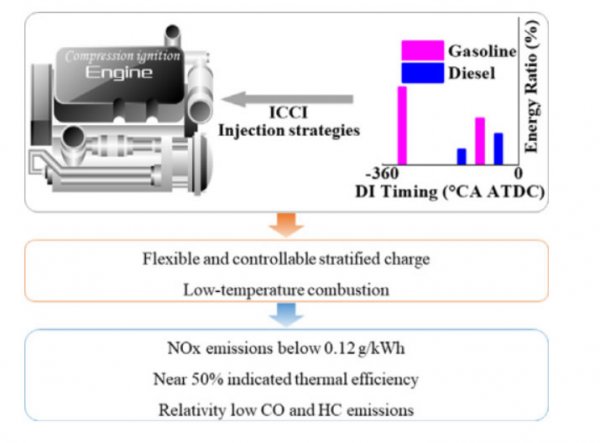
(Image source: greencarcongress)
According to foreign media reports, a research team from Shanghai Jiaotong University has proposed a new combustion mode called intelligent charge compression ignition (ICCI), which can simultaneously achieve ultra-high efficiency and low emissions.
This research aims to form a flexible and controllable in-cylinder charge stratification, powered by two complementary fuels, gasoline and diesel. In order to achieve this dual-fuel combustion mode, the team independently used two common rail direct injection systems on an improved single-cylinder engine, and each injection system was controlled by an independent open electronic control unit.
Researcher Li et al. stated: “In general, the premixed background charge is formed by early injection of most gasoline fuel, and the remaining fuel is injected alternately during the compression stroke to form a controlled reactivity stratification. In During the injection process, diesel and gasoline are mixed in multiple layers, while the piston moves upward. Finally, before the fuel is ignited, ideal stratification is formed, and the concentration and reactivity in the cylinder are adjusted to the best conditions. According to changes in engine operating conditions , Can change the injection timing, fuel split ratio and split flow, real-time adjustment of the cylinder stratification. The ignition timing and combustion rate are controllable, so the thermal efficiency is high and NOx (nitrogen oxide) emissions are low.
Experimental results show that at 85% gasoline ratio, the high indicated thermal efficiency is close to 50%, and NOx emissions are far below 0.12 g/kWh. The research team said: "Based on the best gasoline ratio, the ICCI mode multiple injection strategy can further increase thermal efficiency and improve emissions." They also compared ICCI mode with other combustion modes, including reactive controlled compression ignition (RCCI), G85 Dual direct injection (DDI), G85 and G70 single direct injection (DI) strategies. Under similar operating conditions, ICCI combustion mode performs better than other combustion methods. Compared with RCCI or DDI combustion mode, the indicated thermal efficiency of this mode is improved by about 2%; compared with DI mode, NOx emissions are close to zero.
more specifically:
Compared with ICCI mode, the cycle change of G70 and G85 single-fuel DI fuel strategy is 4% higher, combustion noise is higher than 2 MW/m2, and NOx emissions are higher, about 3-15 g/kWh; while G85 DDI mode ITE (acid salt such as phosphite or sulfite) is less than 45%, and CO and THC (total hydrocarbon) emissions are more than 10 g/kWh. Compared with other single-fuel combustion modes, the ICCI mode also performs better in terms of PM emissions.
The NOx emissions of ICCI and RCCI modes are both lower, less than 0.6 g/kWh. ICCI breaks through the limitations brought by nozzle fuel injection in the dual fuel combustion process. Therefore, its ITE is higher than the RCCI model, and CO emissions are lower. But in this experiment, RCCI's PM emissions are better than ICCI.
It is found that during the fuel ratio adjustment process of ICCI mode, as the gasoline ratio increases, the combustion phase is delayed, NOx emissions decrease, and CO and HC emissions increase. Under the condition that the average indicated pressure is 8bar, the optimal target found in this experiment is that when the gasoline ratio reaches 85%, the efficiency is the highest 49%; at the same time, the NOx emission is low, only 0.1 g/kWh.
The team concluded that on the basis of further optimization in the future, the ICCI combustion mode has great potential. (Elisha)
In order to realize the real-time monitoring of the coal Mine Ventilator, the finite state machine theory is used to analyze the state and control the working process of the Ventilator Control System. According to the operating conditions of theventilator, the control circuit is divided into different working states. These working states are combined into a specific limited state machine to realize the control and state transfer of the VFD, Thus, the reliability of Ventilator Control system can be improved.
Ventilator Control
Ventilator Control,Ventilator Control Cabinet,Pressure Control On Ventilator,Automatic Control For Ventilator
Jiaozuo Huafei Electronic & Electric Co., Ltd. , https://www.intelligentmine.com
![<?echo $_SERVER['SERVER_NAME'];?>](/template/twentyseventeen/skin/images/header.jpg)